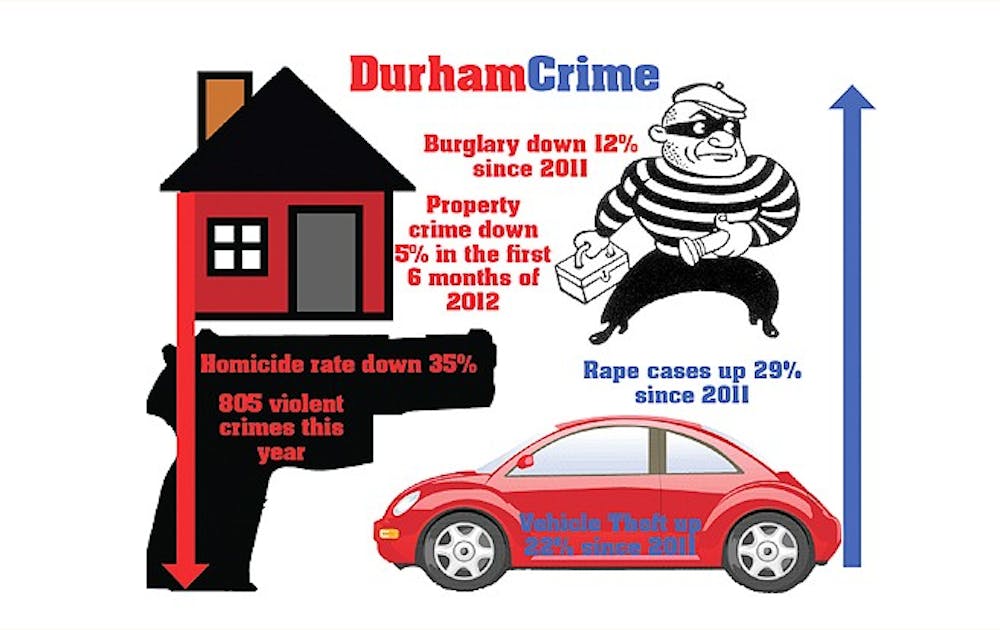Cooperation with a variety of community groups led to a reduction in Bull City crime, Durham Police Chief Jose Lopez said in an interview yesterday.
But the numbers for the first half of 2012 did show a decline across all categories of crime. According to the Durham Police Department’s quarterly report to City Council, overall, violent and property crime decreased by 5 percent in the first six months of 2012 compared to the same period in 2011. Homicide, robbery and burglary decreased significantly—by 35 percent, 14 percent and 12 percent respectively. A 29 percent increase in rape and a 22 percent increase in vehicle theft offset these drops.
The report fits in with a trend of decreasing crime during the past ten years, Lopez said. During that time, DPD has been working to bolster community trust and relationships.
“All in all, I have to believe that a lot of our preventative efforts are really coming to focus now,” Lopez said. “Quite frankly, we cannot be successful without the cooperation of the community.”
In the first half of 2012, DPD worked closely with churh congregations of all denominations and community groups like Partners Against Crime and Project Safe Neighborhoods to reach large numbers of Durham citizens. Chief Lopez noted that DPD collaborates heavily with the Duke University Police Department and other university police departments, saying that the relationship is “almost seamless.”
DUPD Chief John Dailey similarly applauded the cooperation between the Duke and Durham police departments.
“The two departments coordinate frequently and have a very positive working relationship,” Dailey said. “Long-term reduction is best achieved with a holistic approach.”
Increased trust between the DPD and the community leads to more crime reporting, which may explain the increased reported incidents of rape and other crimes, Lopez added.
“The reporting of rape has increased, and a lot of these rapes that we get actually occurred a while back. It’s just that now they’ve decided to come forward,” he said. “It takes a while for them to come forward and we, of course, will investigate it and we will document it.”
The DPD launched a special victims unit in January to focus on crimes of a sexual nature. Greater resources dedicated to such crimes may explain the increased number of reported rapes.
Students may not be as aware of the changes in Durham crime prevention strategies.
Junior and DukeEngage Durham participant Ellen Paddock said that she thought students might not notice the reduction.
“I don’t think we are necessarily able to see that decrease because Duke students are so insulated from the Durham community,” Paddock said.
Crime still has a presence for Duke students off-campus. Senior David Watson, for instance, was robbed over the summer in an off-campus house.
“Obviously this is just one house in one part of Durham, but we got robbed three times in a month,” Watson said.
Watson noted that during at least one incident, the door to their house was not locked.
Lopez mentioned that there tend to be more burglaries and larcenies in areas with many students.
Sophomore Derek Rhodes, Duke Student Government vice president for Durham and regional affairs, argued that if students do not explore off-campus areas, they might form negative perceptions of Durham.
“Students should feel safe in Durham,” Rhodes said. “Durham has never been a major crime city, but it does get a bad reputation.”
Lt. Patrice Andrews stressed the importance of a positive relationship between students and police.
“It is very important to us, it is very important to this organization that students feel comfortable reporting crimes to us,” said Andrews.
Although freshman Sonia Lee has not yet had the time to explore off-campus areas, she feels comfortable doing so in the future.
“Off-campus [crime] doesn’t seem like a serious issue,” Lee said. “I’ve heard if you don’t go alone [off-campus] you’ll be fine—just make sure you’re aware of your surroundings.”
Get The Chronicle straight to your inbox
Signup for our weekly newsletter. Cancel at any time.

